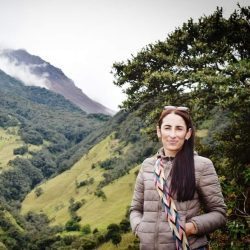Rural and Academic Women Partnership for Grassroots Sustainable Futures In Las Mesas, Colombia
Project
This project addresses the relationship between the multilayered socioeconomic and productive transformations among grass-root women in Las Mesas and their perceptions of gender roles, sustainability and futures. We ask how socioeconomic changes have impacted women's perceptions about the above-detailed aspects. Based on a qualitative and ethnographic-oriented methodology, enriched with Community Based Participatory Research-CBPR, we explore their perceptions and narratives about traditional labour systems and current ones, shifts in gender relationships, and pressing daily life matters. We will put into a dialogue women's own situated experiences, voices, and hopes about future with our views as academic women, particularly regarding what I have previously termed as an eco-politics of care (Espinosa 2023). We seek to empower them-us by means of a growing partnership based on dialogues that decenter hegemonic feminist discourses and dominant narratives of sustainability, opening a better ground for common understandings, solidarity and situated knowledges.
This gendered approach can better underpin every day dilemmas with relation to some of the sustainable development goals: “no poverty,” “good health and wellbeing,”“gender equality,” and “reduced inequalities.” According to the National Statistical Department, the 2022 Nariño Multidimensional Poverty Index is 17.8% although in rural areas is 21.4%. In spite of the fact that percentages decreased within the span of one year, from 2021 to 2022, there are still many actions to implement to fill the inequality gap and improve women and families´ quality of life, food security, and access to health and education services. Our previous collaborative research in Las Mesas focused on the effects of the illegal poppy economy since the 1980s, especially with regard to the traditional division of labour and the role of women as incoming entrepreneurs in this economy (Gómez 2022, Espinosa & Prieto 2022a, 2022b). To a lesser extent, we examined the dilemmas brought by natural conservation policies and the creation of the National Natural Park - Volcanic Complex Doña Juana - Cascabel in 2007, and the culturally perceived environmental effects of the intense periods of aerial aspersion with glyphosate (which has been Colombia's main anti-drug strategy) in humans and soils´ health (Espinosa & Prieto 2022b). Our experience has taught us that our concerns with equality, justice, and freedom as academic women do not equally match grassroots women's concerns. We are aware of the fact that we need to examine everyday dilemmas to better grasp what is at stake. We know that local women work side by side with their families and partners to support the household, care for the children and elderly, and respond to micro-entrepreneur projects to meet ends, providing in some cases the steady income: weaving, artisanship, cheese production, chicken and small domestic animals breeding, livestock care, informal food services, poppy cultivation, etc. Nevertheless, we need to examine how such tasks are culturally valued. The findings will be key for the larger Flor de Mayo Association collaborative project, oriented to forest conservation and sustainable agri-food systems.

